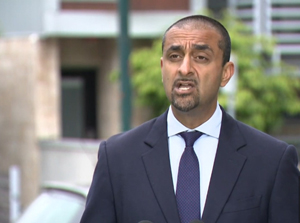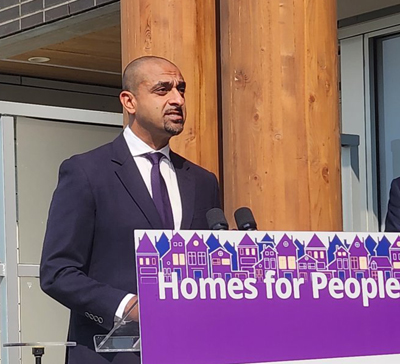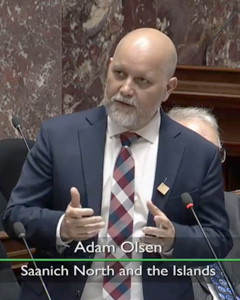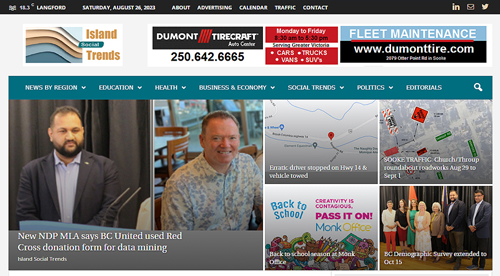Monday August 28, 2023 | VANCOUVER, BC [Updated 1:05 pm]
by Mary P Brooke | Island Social Trends
BC Housing Minister Ravi Kahlon is taking on the challenges of housing supply in BC.
Today from Vancouver he replied to an Island Social Trends question about short-term rentals (STR’s).

Kahlon said his staff have met with Airbnb and VRBO to discuss both the challenges and what these companies have to say.
“Overwhelmingly I hear from communities that they just can’t get that data out of these companies about what is actually on their site and what is not,” said Kahlon.
National STR problem:
“Quite frankly, it’s a challenge that municipalities are dealing with across the country,” he said.
BC is coming out with legislation this fall regarding short-term rentals. But today Kahlon pointed out that even strong legislation may not produce desired results. “Even Quebec, which had the strongest legislation in place, they even struggled with getting that correct information (from STR’s),” said Minister Kahlon today.
“I am not under any illusion that somehow the information we need is going to be provided to us. But certainly we’d be open to them providing that information to us so that we can make good decisions both at a community level but at a provincial level as well,” said BC’s housing minister today.
Upcoming BC legislation:
“Short-term rental (STR) of homes in B.C. is diverting much-needed long-term rental housing off the market. This is a significant problem that contributes to a very low rental vacancy rate and high rents in most B.C communities,” said Kahlon in a statement to Island Social Trends back on August 11.
“Local governments in B.C. currently have some tools to regulate short term rentals, mainly to try to protect the long-term housing stock in their communities. Existing tools for local governments include zoning, requiring a business license and by-laws to limit short term rentals. However, local governments need additional tools to address challenges related to compliance and enforcement of local bylaws governing short term rentals, and we’re delivering on those needs,” said Kahlon earlier this month.
“The Province is working on solutions to address this challenge, as requested by local governments. As committed to in our Homes for People plan, we are working with local governments to make it easier for them to ensure that short-term rental platforms and hosts play by the rules — and help return much-needed long-term rental homes into the market. Legislation to address concerns around short-term rentals that will be introduced in the upcoming fall session of the Legislature.”

Fund to build rentals:
Housing Minister Kahlon was in Vancouver today to announce new funding for municipalities, First Nations and other organization to partner in building affordable housing projects for Indigenous Peoples, families, seniors, individuals and people living with disabilities throughout the province.
Applications will be open to mid-November 2023.
The new round of CHF funding will aim to produce 3,500 homes, as part of a goal to produce 20,000 CHF-funded homes by 2032.
Challenges are opportunities:
Kahlon was joined at today’s announcement by the mayor of Vancouver, Ken Sim, who said that challenges are opportunities, and hopes that approach will be applied to the housing challenge.
In particular, Sim said that the challenge of needing more hotel rooms and accommodations for visitors who come to the FIFA World Cup games at BC Place in 2026 in Vancouver could result in more accommodations after that for people who live in BC’s largest city.
Market disruption:
The BC Greens point out that the short-term rental market is “getting out of control in British Columbia”. On August 15, BC Green MLA Adam Olsen pointed out that a business license is required to host an Airbnb in Vancouver, but there are only 2,964 business licenses registered in the city, compared to 4,929 active Airbnb listings.
Olsen suggests that there are thousands of unlicensed short-term rentals in Vancouver and a lack of regulatory enforcement. “These short-term units take away housing opportunities for those living in the city long-term, making the housing market even more difficult to navigate,” said Olsen.
On August 15, Olsen said: “The BC NDP government needs to establish a provincial registry of STVRs and enable data sharing between local governments, the province, and rental platforms. They need to increase STVR platform accountability by ensuring only registered properties are listed, authorize regional districts to issue business licenses and provide resources for local governments to enforce existing bylaws.”









